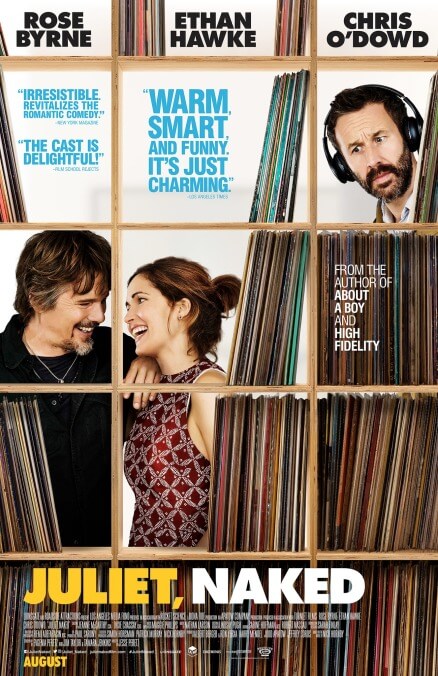Rose Byrne and Ethan Hawke swap mash emails in the tepid Nick Hornby rom-com Juliet, Naked

Neither Romeo nor nudity makes an appearance in Juliet, Naked, a labored romantic comedy adapted from Nick Hornby’s 2009 novel. In fact, there isn’t even a title character—Juliet is the name of an album by fictional indie rocker Tucker Crowe (Ethan Hawke), who disappeared between sets of a gig back in the ’90s, never to be heard from again. Such enduring mystery only fuels the passion of Tucker’s diehard fans, most of whom are now easing their way into middle age. The most rabid of these, perhaps, is Duncan (Chris O’Dowd), an English TV/cinema professor (he teaches a course on The Wire) who maintains a Tucker Crowe website and message board in his spare time, sharing the latest rumors about their hero’s possible whereabouts. So obsessed is Duncan that he has little time left over for his live-in girlfriend, Annie (Rose Byrne), especially after he unexpectedly receives “naked” (i.e., acoustic) Juliet demos in the mail. Frustrated, Annie posts a scathing review on Duncan’s site… and receives an email from Tucker himself.
That’s when Juliet, Naked, as a movie, runs smack into the contemporary rom-com’s bête noire: online dating. Ever since You’ve Got Mail, filmmakers have struggled to generate sparks from two people in separate locations tapping on keyboards, accompanied by voice-over recitation of what they’re writing. It works about as well here as it always has. While Annie and Tucker forge their long-distance connection (unbeknownst to Duncan), the film gradually gets mired in a swamp of earnest verbiage and bland imagery. Even when the two finally meet in person, certain aspects of Hornby’s high concept feel overly contrived, either due to revision/compression (four writers, including Tamara Jenkins and erstwhile Alexander Payne collaborator Jim Taylor, get screenplay credit) or just because we’re looking at actors rather than imagining faces. It’s hard to believe that Annie would somehow forget, when inviting Tucker home, that one room in her house has pictures of him plastered on all four walls. And while the book’s Duncan might fail to recognize the book’s Tucker, who’s a quarter century older than his last known photograph, Ethan Hawke at 47 looks exactly like an older version of Ethan Hawke at 22.
In most other respects, Hawke is ideally cast as a charming fuckup who retreated from success because he couldn’t handle personal responsibility. (Tucker Crowe’s music, however, doesn’t sound like it would inspire cultish worship. Ryan Adams, Conor Oberst, and Robyn Hitchcock contributed songs, but Hawke, who does his own singing, doesn’t have the voice or presence to pull them off.) Byrne, too, does solid work, finding a tart, rebellious streak within Annie’s generally placid temperament. Occasionally, as when Duncan angrily tells Tucker what Juliet (an album Tucker hates) has meant to him, the movie successfully translates Hornby’s gift for capturing pop culture’s seismic impact, both positive and negative. But getting to the good stuff requires slogging through a good 45 minutes of expository narration, strained plot twists (Tucker having a heart attack on the very day that he and Annie are to meet), and all of that tiresome tappity-tap-tap. Epistolary courtship can be achingly romantic—but only on paper, where it belongs.